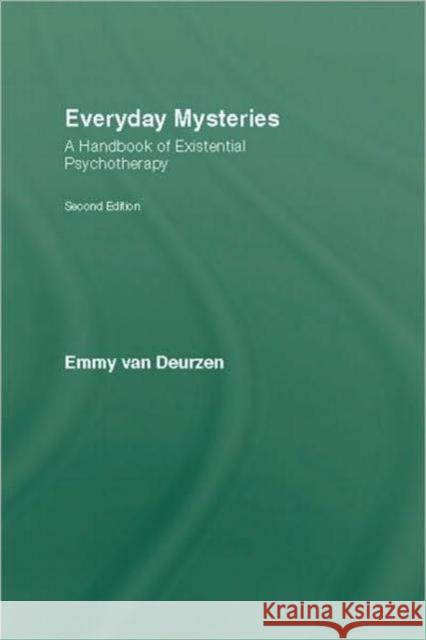Everyday Mysteries: A Handbook of Existential Psychotherapy » książka
Everyday Mysteries: A Handbook of Existential Psychotherapy
ISBN-13: 9780415376426 / Angielski / Twarda / 2010 / 384 str.
Everyday Mysteries: A Handbook of Existential Psychotherapy
ISBN-13: 9780415376426 / Angielski / Twarda / 2010 / 384 str.
(netto: 558,60 VAT: 5%)
Najniższa cena z 30 dni: 579,30
ok. 22 dni roboczych.
Darmowa dostawa!
This book provides an in-depth introduction to existential psychotherapy. Presenting a philosophical alternative to other forms of psychological treatment, it emphasises the problems of living and the human dilemmas that are often neglected by practitioners who focus on personal psychopathology. Emmy van Deurzen defines the philosophical ideas that underpin existential psychotherapy, summarising the contributions made by Kierkegaard, Nietzsche, Heidegger and Sartre among others. She proposes a systemic and practical method of existential psychotherapy, illustrated with detailed case material. This expanded and updated second edition includes new chapters on the contributions of Max Scheler, Albert Camus, Gabriel Marcel and Emmanuel Levinas, as well as on feminist contributors such as Simone de Beauvoir and Hannah Arendt. In addition a new extended case discussion illustrates the approach in practice. Everyday Mysteries offers a fresh perspective for anyone training in psychotherapy, counselling, psychology or psychiatry. Those already established in practice will find this a stimulating source of ideas about everyday life and the mysteries of human experience, which will throw new light on old issues.
This book provides an in-depth introduction to existential psychotherapy. Presenting a philosophical alternative to other forms of psychological treatment, it emphasises the problems of living and the human dilemmas that are often neglected by practitioners who focus on personal psychopathology.
Emmy van Deurzen defines the philosophical ideas that underpin existential psychotherapy, summarising the contributions made by Kierkegaard, Nietzsche, Heidegger and Sartre among others. She proposes a systemic and practical method of existential psychotherapy, illustrated with detailed case material. This expanded and updated second edition includes new chapters on the contributions of Max Scheler, Albert Camus, Gabriel Marcel and Emmanuel Levinas, as well as on feminist contributors such as Simone de Beauvoir, Hannah Arendt amongst others. In addition a new extended case discussion illustrates the approach in practice.
Everyday Mysteries offers a fresh perspective for anyone training in psychotherapy, counselling, psychology or psychiatry. Those already established in practice will find this a stimulating source of ideas about everyday life and the mysteries of human experience, which will throw new light on old issues.











